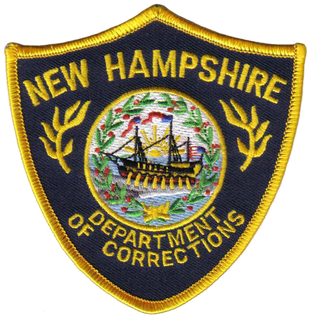A pardon is a government decision to allow a person to be relieved of some or all of the legal consequences resulting from a criminal conviction. A pardon may be granted before or after conviction for the crime, depending on the laws of the jurisdiction.
A parole board is a panel of people who decide whether an offender should be released from prison on parole after serving at least a minimum portion of their sentence as prescribed by the sentencing judge. Parole boards are used in many jurisdictions, including the United Kingdom, the United States, and New Zealand. A related concept is the board of pardons and paroles, which may deal with pardons and commutations as well as paroles.

The Correctional Service of Canada, also known as Correctional Service Canada or Corrections Canada, is the Canadian federal government agency responsible for the incarceration and rehabilitation of convicted criminal offenders sentenced to two years or more. The agency has its headquarters in Ottawa, Ontario.
In the English and British tradition, the royal prerogative of mercy is one of the historic royal prerogatives of the British monarch, by which they can grant pardons to convicted persons. The royal prerogative of mercy was originally used to permit the monarch to withdraw, or provide alternatives to, death sentences; the alternative of penal transportation to "partes abroade" was used since at least 1617. It is now used to change any sentence or penalty. A royal pardon does not overturn a conviction.

Capital punishment is a legal penalty in the U.S. state of Texas for murder, and participation in a felony resulting in death if committed by an individual who has attained or is over the age of 18.

The Tennessee Department of Correction (TDOC) is a Cabinet-level agency within the Tennessee state government responsible for the oversight of more than 20,000 convicted offenders in Tennessee's fourteen prisons, three of which are privately managed by CoreCivic. The department is headed by the Tennessee Commissioner of Correction, who is currently Frank Strada. TDOC facilities' medical and mental health services are provided by Corizon. Juvenile offenders not sentenced as adults are supervised by the independent Tennessee Department of Children's Services, while inmates granted parole or sentenced to probation are overseen by the Department of Correction (TDOC)/Department of Parole. The agency is fully accredited by the American Correctional Association. The department has its headquarters on the sixth floor of the Rachel Jackson Building in Nashville.

The New Hampshire Department of Corrections is the government agency in the U.S. state of New Hampshire charged with overseeing the state correctional facilities, supervising probation and parolees, and serving in an advisory capacity in the prevention of crime and delinquency. As of June 30, 2013, the Department had an inmate population of 2,791, 15,267 on probation or parole, and 893 total employees, 470 as corrections officers and 64 as probation/parole officers. The agency has its headquarters in Concord.
The Oklahoma Pardon and Parole Board is the parole board of the state of Oklahoma. The board was created by an amendment to the Oklahoma Constitution in 1944. The Board has the authority to empower the Governor of Oklahoma to grant pardons, paroles, and commutations to people convicted of offenses against the state of Oklahoma.
In the United States, life imprisonment is the most severe punishment provided by law in states with no valid capital punishment statute, and second-most in those with a valid statute. According to a 2013 study, 1 of every 2 000 inhabitants of the U.S. were imprisoned for life as of 2012.

The Florida Department of Corrections (FDC) is the government agency responsible for operating state prisons in the U.S. state of Florida. It has its headquarters in the state capital of Tallahassee.

The Department of Public Safety and Corrections (DPS&C) is a state law enforcement agency responsible for the incarceration of inmates and management of facilities at state prisons within the state of Louisiana. The agency is headquartered in Baton Rouge. The agency comprises two major areas: Public Safety Services and Corrections Services. The secretary, who is appointed by the governor of Louisiana, serves as the department's chief executive officer. The Corrections Services deputy secretary, undersecretary, and assistant secretaries for the Office of Adult Services and the Office of Youth Development report directly to the secretary. Headquarters administration consists of centralized divisions that support the management and operations of the adult and juvenile institutions, adult and juvenile probation and parole district offices, and all other services provided by the department.
The Georgia State Board of Pardons and Paroles is a five-member panel authorized to grant paroles, pardons, reprieves, remissions, commutations, and to remove civil and political disabilities imposed by law. Created by a constitutional amendment in 1943, it is part of the executive branch of Georgia's government. Members are appointed by the governor to staggered, renewable seven-year terms subject to confirmation by the State Senate.

Marsy's Law, the California Victims' Bill of Rights Act of 2008, enacted by voters as Proposition 9 through the initiative process in the November 2008 general election, is an amendment to the state's constitution and certain penal code sections. The act protects and expands the legal rights of victims of crime to include 17 rights in the judicial process, including the right to legal standing, protection from the defendant, notification of all court proceedings, and restitution, as well as granting parole boards far greater powers to deny inmates parole. Critics allege that the law unconstitutionally restricts defendant's rights by allowing prosecutors to withhold exculpatory evidence under certain circumstances, and harms victims by restricting their rights to discovery, depositions, and interviews. Passage of this law in California led to the passage of similar laws in Florida, Georgia, Illinois, Kentucky, Nevada, North Carolina, Oklahoma, Ohio and Wisconsin, and efforts to pass similar laws in Hawaii, Iowa, Montana, Idaho, South Dakota, and Pennsylvania. In November 2017, Marsy's Law was found to be unconstitutional and void in its entirety by the Supreme Court of Montana for violating that state's procedure for amending the Montana Constitution. The Pennsylvania Supreme Court reached the same conclusion as Montana under its own state constitution in 2021.
The Texas Board of Pardons and Paroles (BPP) is a state agency that makes parole and clemency decisions for inmates in Texas prisons. It is headquartered in Austin, Texas.
Richard Eugene Glossip is an American prisoner currently on death row at Oklahoma State Penitentiary after being convicted of commissioning the 1997 murder of Barry Van Treese. The man who murdered Van Treese, Justin Sneed, had a "meth habit" and agreed to plead guilty in exchange for testifying against Glossip. Sneed received a life sentence without parole. Glossip's case has attracted international attention due to the unusual nature of his conviction, namely that there was little or no corroborating evidence, with the first case against him described as "extremely weak" by the Oklahoma Court of Criminal Appeals.
Capital punishment is a legal penalty in the U.S. state of Kentucky.
Cathy Stocker is a former District Attorney for Blaine, Canadian, Garfield, Grant and Kingfisher counties in Oklahoma for 28 years before retiring in 2010, and a former member of the Oklahoma Pardon and Parole Board.
Richard Smothermon is a current Oklahoma Pardon and Parole Board member and former District Attorney in Oklahoma.








